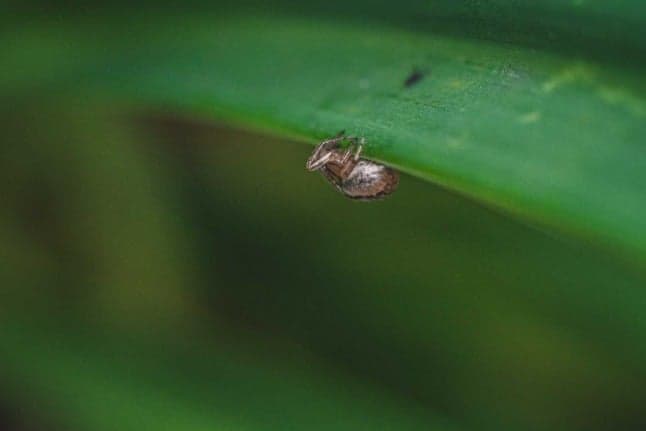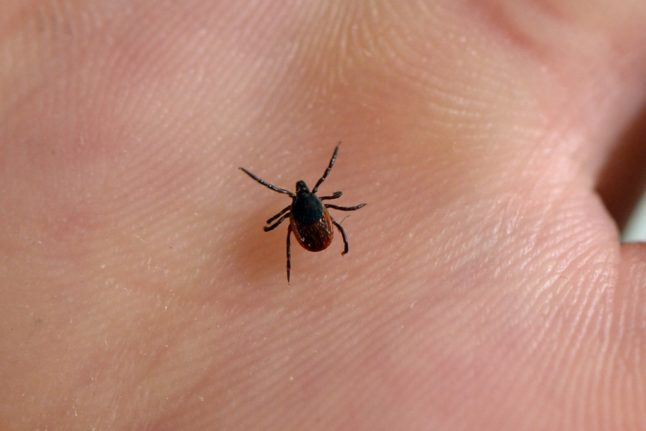Ticks in Austria: How to avoid them and what to do if you get bitten

Several regions in Austria are considered high risk areas for tick-borne encephalitis (TBE), but there's a risk of contracting the disease anywhere. We explain how to avoid the eight-legged blood-suckers and what to do if you get bitten.
What are ticks?
Ticks are tiny, spider-like creatures that are usually between 1mm to 1cm in size. They generally live in long grass, bushes and wooded areas.
These little arachnids don’t fly or jump but climb onto animals or humans as they brush past. They are parasites, and once a tick bites into the skin, it feeds on blood for a few days before dropping off.
Are they dangerous?
During this unpleasant bloodsucking transaction, ticks can transmit diseases to humans, which can become dangerous.
The disease which is mostly associated with ticks in Austria is tick-borne encephalitis (TBE) which, in severe cases, can cause permanent damage such as paralysis or even death. Austria is one of the most affected areas for this disease in central Europe, and the increasingly warm climate means that ticks are surviving longer throughout the year - though they are most active in summer.
The other main disease associated with ticks is Lyme disease which, in the most severe cases, can attack the nervous system, joints, and organs. According to health experts, around 30 percent of ticks in Austria are infected with the Lyme bacteria.
What are the symptoms?
Those who develop Lyme disease can get flu-like symptoms a few days or weeks after being bitten by an infected tick. Children might lose their appetite, lack energy, or complain of stomach aches.
But the most obvious sign of Lyme disease is a red circular rash around the bite.
However, if you remove the tick in less than twelve hours, you usually have nothing to worry about, as it takes a while for the infection to be passed onto humans.
The situation is different with TBE, however, as the disease is transmitted much faster.
Most people infected with TBE don’t have any symptoms, while one in three initially suffers from flu-like symptoms such as fever, headache, and aching limbs. In rare cases, the spinal cord can be affected, with symptoms such as severe headaches and neck pain, nausea, and impaired consciousness.
In the majority of patients, the disease heals completely, but in an average of one percent of cases, it can be fatal.
Can I get vaccinated against TBE?
Yes, and according to health authorities, you should.
Austria applies a three-dose vaccination scheme for children and adults. The first dose should be given after the first birthday (or at any time in the case of adults). Then, depending on the vaccination, the second dose should be taken four weeks after the first one and the third one from five to nine months.
Boosters should be taken every five years, according to the Vienna vaccination service.
The protective effect of the vaccines begins approximately two weeks after the second dose, and vaccination protection is almost 100%.
READ ALSO: Austria rolls out ‘tick vaccine’ – where can you get it?
Where am I most likely to get bitten?
Though TBE infections occur more frequently in so-called TBE risk areas, health authorities warn that people spending time in the great outdoors can contract the disease anywhere in Austria.
However, areas considered high risk include the regions along the Danube between Passau and Linz, areas in the Wachau valley, the countryside around St. Pölten and in and around Vienna.
Before the vaccination was rolled out in Austria in 1981, there were around 300-700 cases per year, though this has since dropped to around 41-216 cases per year, with visitors from abroad among the worst affected. On average, two people still die per year from TBE.
According to current research, anyone without vaccination is at risk of severe TBE illness and may potentially experience permanent nerve damage and paralysis. 
Photo by Bertrand Guay/ AFP
What should I do if I get bitten by a tick?
Firstly, it is unlikely that you will even feel the tick bite, which is why it’s important to check yourself carefully when returning from a trip to the countryside or a risk area.
Ticks tend to bite around thin areas of the skin, such as kneecaps, groin, armpits, and hairline. In children, they can often be found on the scalp and behind the ears.
If you do find a tick, you should remove it quickly with a special tick remover (available at all pharmacies), tweezers, or your fingernails. The sooner you can do this, the lower the risk the tick will be able to infect you.
The important thing is to make sure you remove the whole tick by grabbing it as close to the skin as possible and pulling slowly. Then wash and clean the bite, and contact a doctor if you’re worried.
One thing you shouldn’t do is to put oily liquids on the tick, as this could enrage it and cause it to release saliva potentially containing harmful pathogens.
READ ALSO: Six things to know about visiting a doctor in Austria
How can I prevent a tick bite?
If you’ll be spending time in wooded areas, long grass, or known risk areas, you should wear long-sleeved tops and full-legged trousers and tuck trousers into socks. Children should also wear a hat, as ticks can climb to their height in bushes.
In short: have as little skin exposed as possible.
It’s also sensible to wear light-coloured clothing so you can easily spot a tick.
Useful vocabulary
tick = (die) Zecke = tick
tick bite = (der) Zeckenbiss
tweezers = (die) Pinzette
tick pliers = (die) Zeckenzange
Comments
See Also
What are ticks?
Ticks are tiny, spider-like creatures that are usually between 1mm to 1cm in size. They generally live in long grass, bushes and wooded areas.
These little arachnids don’t fly or jump but climb onto animals or humans as they brush past. They are parasites, and once a tick bites into the skin, it feeds on blood for a few days before dropping off.
Are they dangerous?
During this unpleasant bloodsucking transaction, ticks can transmit diseases to humans, which can become dangerous.
The disease which is mostly associated with ticks in Austria is tick-borne encephalitis (TBE) which, in severe cases, can cause permanent damage such as paralysis or even death. Austria is one of the most affected areas for this disease in central Europe, and the increasingly warm climate means that ticks are surviving longer throughout the year - though they are most active in summer.
The other main disease associated with ticks is Lyme disease which, in the most severe cases, can attack the nervous system, joints, and organs. According to health experts, around 30 percent of ticks in Austria are infected with the Lyme bacteria.
What are the symptoms?
Those who develop Lyme disease can get flu-like symptoms a few days or weeks after being bitten by an infected tick. Children might lose their appetite, lack energy, or complain of stomach aches.
But the most obvious sign of Lyme disease is a red circular rash around the bite.
However, if you remove the tick in less than twelve hours, you usually have nothing to worry about, as it takes a while for the infection to be passed onto humans.
The situation is different with TBE, however, as the disease is transmitted much faster.
Most people infected with TBE don’t have any symptoms, while one in three initially suffers from flu-like symptoms such as fever, headache, and aching limbs. In rare cases, the spinal cord can be affected, with symptoms such as severe headaches and neck pain, nausea, and impaired consciousness.
In the majority of patients, the disease heals completely, but in an average of one percent of cases, it can be fatal.
Can I get vaccinated against TBE?
Yes, and according to health authorities, you should.
Austria applies a three-dose vaccination scheme for children and adults. The first dose should be given after the first birthday (or at any time in the case of adults). Then, depending on the vaccination, the second dose should be taken four weeks after the first one and the third one from five to nine months.
Boosters should be taken every five years, according to the Vienna vaccination service.
The protective effect of the vaccines begins approximately two weeks after the second dose, and vaccination protection is almost 100%.
READ ALSO: Austria rolls out ‘tick vaccine’ – where can you get it?
Where am I most likely to get bitten?
Though TBE infections occur more frequently in so-called TBE risk areas, health authorities warn that people spending time in the great outdoors can contract the disease anywhere in Austria.
However, areas considered high risk include the regions along the Danube between Passau and Linz, areas in the Wachau valley, the countryside around St. Pölten and in and around Vienna.
Before the vaccination was rolled out in Austria in 1981, there were around 300-700 cases per year, though this has since dropped to around 41-216 cases per year, with visitors from abroad among the worst affected. On average, two people still die per year from TBE.
According to current research, anyone without vaccination is at risk of severe TBE illness and may potentially experience permanent nerve damage and paralysis. 
What should I do if I get bitten by a tick?
Firstly, it is unlikely that you will even feel the tick bite, which is why it’s important to check yourself carefully when returning from a trip to the countryside or a risk area.
Ticks tend to bite around thin areas of the skin, such as kneecaps, groin, armpits, and hairline. In children, they can often be found on the scalp and behind the ears.
If you do find a tick, you should remove it quickly with a special tick remover (available at all pharmacies), tweezers, or your fingernails. The sooner you can do this, the lower the risk the tick will be able to infect you.
The important thing is to make sure you remove the whole tick by grabbing it as close to the skin as possible and pulling slowly. Then wash and clean the bite, and contact a doctor if you’re worried.
One thing you shouldn’t do is to put oily liquids on the tick, as this could enrage it and cause it to release saliva potentially containing harmful pathogens.
READ ALSO: Six things to know about visiting a doctor in Austria
How can I prevent a tick bite?
If you’ll be spending time in wooded areas, long grass, or known risk areas, you should wear long-sleeved tops and full-legged trousers and tuck trousers into socks. Children should also wear a hat, as ticks can climb to their height in bushes.
In short: have as little skin exposed as possible.
It’s also sensible to wear light-coloured clothing so you can easily spot a tick.
Useful vocabulary
tick = (die) Zecke = tick
tick bite = (der) Zeckenbiss
tweezers = (die) Pinzette
tick pliers = (die) Zeckenzange
Join the conversation in our comments section below. Share your own views and experience and if you have a question or suggestion for our journalists then email us at [email protected].
Please keep comments civil, constructive and on topic – and make sure to read our terms of use before getting involved.
Please log in here to leave a comment.